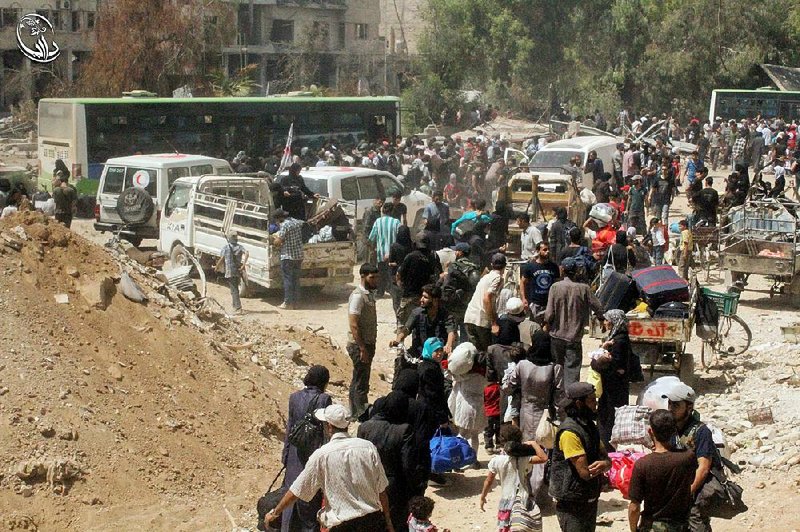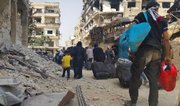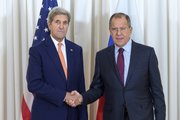DARAYA, Syria -- Syrian rebels and their families began evacuating a Damascus suburb Friday as part of an agreement reached with the government after four years of grueling airstrikes and siege that left the suburb in ruins.
The surrender of Daraya, which became an early symbol of the nascent uprising against President Bashar Assad, marks a success for his government, removing a persistent threat only a few miles from his seat of power. It provides a further boost for the Syrian army as it fights opposition forces for control over Aleppo, Syria's largest city.
Daraya's rebels agreed to evacuate in a deal late Thursday. Under the terms of the deal, about 700 gunmen will be allowed safe exit to the opposition-held northern province of Idlib, while some 4,000 civilians will be taken temporarily to a shelter south of Daraya.
The suburb has been blockaded by government forces, with only one food delivery by the United Nations allowed to reach the district during the siege. It has been held by a coalition of ultraconservative Islamic militias, including the Martyrs of Islam Brigade.
As the first white bus with rebels and their families emerged from Daraya, Syrian army soldiers swarmed the vehicle, shouting pro-Assad slogans.
The development comes as U.S. Secretary of State John Kerry arrived in Geneva on Friday for talks with Russian Foreign Minister Sergey Lavrov. After meeting off and on with Lavrov for nearly 10 hours, Kerry said the two "have achieved clarity" on a path to restore a truce in Syria but details remain to be worked out.
Neither Kerry nor Lavrov described the talks in detail.
The talks center on proposals to share intelligence and coordinate militarily with Russia against the Islamic State extremist group and the al-Qaida branch in Syria and Iraq. Russia and Iran are strong backers of Assad and have been accused of targeting Western-backed rebel forces.
Asked at the start of the gathering to identify the main impediment to a broader nationwide ceasefire, Lavrov responded: "I don't want to spoil the atmosphere for the negotiations."
Any U.S.-Russian coordination would be complicated by the fact that Russia says there are Islamic extremist groups mixed in with the moderate rebels that the U.S. supports. Russia accuses the U.S. of preventing strikes on terrorist groups out of concern that would mean targeting these rebels.
"A terrorist center" remains in those areas of Syria and "no one can deal with it because so-called moderate opposition groups are there," Russian Foreign Ministry spokesman Maria Zakharova said in an interview the day before the talks.
At the moment, a key focus is the humanitarian situation in Aleppo. The U.N. special envoy for Syria, Staffan de Mistura, said Thursday that Russia has agreed to a 48-hour ceasefire there and he's waiting to hear if rebels will do the same. He said trucks are ready to take humanitarian relief to the city.
On Friday, de Mistura called for the protection of people being evacuated from Daraya and said their departure must be voluntary. In a statement issued in Geneva, he said the U.N. was not consulted or involved in the negotiation of the deal reached between rebel factions and government forces.
"The world is watching," de Mistura said.
Located just southwest of Damascus, Daraya has been pummeled by government airstrikes, barrel bombs and fighting over the years. In August 2012, around 400 people were killed over several days by troops and pro-government militiamen who stormed the suburb after heavy fighting and days of shelling, according to opposition activists.
At least 48 green and white buses, eight ambulances and several Red Crescent and U.N. vehicles were lined up at the entrance of Daraya earlier Friday, waiting for the green light.
A journalist who entered the suburb from the north saw a landscape of severely damaged and deserted buildings, some of them charred. A group of uniformed soldiers celebrated, shouting pro-Syria slogans and flashing victory signs.
Black smoke rose on the horizon -- caused by the rebels burning their belongings before evacuating, according to Syrian army soldiers.
Footage posted on the Internet by a member of the Daraya local council shows a small group of a few dozen people milling about in a street lined with destroyed buildings. Surrounded by some meager belongings, they appear to be waiting to be evacuated. Women in full face cover are seen sitting on pieces of rubble while bearded men walk about.
Under the deal, the government is to allow safe exit to hundreds of gunmen and their families out of Daraya and let them head to the opposition-held northern province of Idlib. Civilians will be taken to Kesweh, south of Daraya.
"Idlib will be their graveyard," said a Syrian army soldier. "This is a precious moment for every Syrian," he added. The soldiers spoke on condition of anonymity in line with regulations.
Daraya, which lies in the western Ghouta region, saw some of the first demonstrations against Assad after the uprising against his family rule began in March 2011, during which residents took to the streets, sometimes pictured carrying red and white roses to reflect the peaceful nature of their protests.
It is the latest rebel-held area to surrender to government troops after years of siege. Opposition activists and human-rights groups accuse the government of using siege and starvation tactics to force surrender by the opposition.
Information for this article was contributed by Albert Aji, Zeina Karam, Sarah El Deeb, Jamey Keaten and Matthew Lee of The Associated Press and by Nick Wadhams and Henry Meyer of Bloomberg News.
A Section on 08/27/2016



